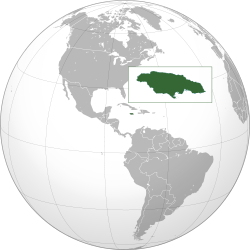Portal:Jamaica
The Jamaica Portal
Jamaica (/dʒəˈmeɪkə/ ⓘ jə-MAY-kə; Jamaican Patois: Jumieka [dʒʌˈmie̯ka]) is an island country in the Caribbean Sea and the West Indies. At 10,990 square kilometres (4,240 sq mi), it is the third largest island—after Cuba and Hispaniola—of the Greater Antilles and the Caribbean. Jamaica lies about 145 km (90 mi) south of Cuba, 191 km (119 mi) west of Hispaniola (the island containing Haiti and the Dominican Republic), and 215 km (134 mi) south-east of the Cayman Islands (a British Overseas Territory). With 2.8 million people,0 Jamaica is the third most populous Anglophone country in the Americas (after the United States and Canada), and the fourth most populous country in the Caribbean. Kingston is the country's capital and largest city. Most Jamaicans are of Sub-Saharan African ancestry, with significant European, East Asian (primarily Chinese), Indian, Lebanese, and mixed-race minorities. Because of a high rate of emigration for work since the 1960s, there is a large Jamaican diaspora, particularly in Canada, the United Kingdom, and the United States. The country has a global influence that belies its small size; it was the birthplace of the Rastafari religion, reggae music (and such associated genres as dub, ska and dancehall), and it is internationally prominent in sports, including cricket, sprinting, and athletics. Jamaica has sometimes been considered the world's least populous cultural superpower. (Full article...) Selected article -Prostitution in Jamaica is illegal but widely tolerated, especially in tourist areas. UNAIDS estimate there to be 18,696 prostitutes in the country. The island is a destination for sex tourism. The Terry McMillan novel, and later film, How Stella Got Her Groove Back, was based on female sex tourism in Jamaica. Transactional sex also occurs. (Full article...)Did you know (auto-generated)
Selected biography -Grace Beverly Jones OJ (born 19 May 1948) is a Jamaican singer, songwriter, model and actress. Born in Jamaica, she and her family moved to Syracuse, New York, when she was a teenager. Jones began her modelling career in New York state, then in Paris, working for fashion houses such as Yves St. Laurent and Kenzo, and appearing on the covers of Elle and Vogue. She notably worked with photographers such as Jean-Paul Goude, Helmut Newton, Guy Bourdin, and Hans Feurer, and became known for her distinctive androgynous appearance and bold features. Beginning in 1977, Jones embarked on a music career, securing a record deal with Island Records and initially becoming a high-profile figure of New York City's Studio 54-centered disco scene. In the early 1980s, she moved toward a new wave style that drew on reggae, funk, post-punk, and pop music, frequently collaborating with both the graphic designer Jean-Paul Goude and the musical duo Sly & Robbie. She scored Top 40 entries on the UK Singles Chart with "Private Life", "Pull Up to the Bumper", "I've Seen That Face Before", and "Slave to the Rhythm". In 1982, she released the music video collection A One Man Show, directed by Goude, which earned her a nomination for Best Video Album at the 26th Annual Grammy Awards. Her most popular albums include Warm Leatherette (1980), Nightclubbing (1981), and Slave to the Rhythm (1985). (Full article...)General images -The following are images from various Jamaica-related articles on Wikipedia.
This is a Good article, an article that meets a core set of high editorial standards.
Brian Williamson (4 September 1945 – 9 June 2004) was a Jamaican gay rights activist who co-founded the Jamaica Forum for Lesbians, All-Sexuals and Gays (J-FLAG). He was known for being one of the earliest openly gay men in Jamaican society and one of its best known gay rights activists. Born to an upper-middle-class family in Saint Ann Parish, Williamson initially considered a life in the Roman Catholic clergy before deciding to devote himself to the cause of gay rights in Jamaica. In the 1990s, he purchased an apartment building in the New Kingston area of Kingston, in which he established a gay nightclub, which remained open for two years despite opposition from police. In 1998, he co-founded J-FLAG with other lesbian, gay, bisexual, and transgender (LGBT) rights activists, soon becoming the public face of the organisation. As J-FLAG's representative, he argued in favour of LGBT rights during appearances on Jamaican television and radio programs. This attracted great hostility within Jamaica – a country with particularly high rates of anti-gay prejudice – with J-FLAG members receiving death threats and Williamson surviving a knife attack. For a time he left Jamaica, living in Canada and England for several years, before returning to Kingston in 2002. (Full article...)Selected picture - An Air Jamaica Airbus A340-300 (registration 6Y-JMP) landing at London Heathrow Airport, England
Selected cuisines, dishes and foods - Jerk is a style of cooking native to Jamaica, in which meat is dry-rubbed or wet marinated with a hot spice mixture called Jamaican jerk spice. The art of jerking (or cooking with jerk spice) originated with indigenous peoples in Jamaica from the Arawak and Taíno tribes, and was carried forward by the descendants of 17th century Jamaican Maroons who intermingled with them. (Full article...)
More did you know
Selected listsTopicsCategoriesRelated portals
WikiProjectsGeographical:
History and Society:
Tasks
Associated WikimediaThe following Wikimedia Foundation sister projects provide more on this subject:
More portals | ||||||||||




















































